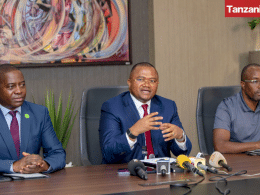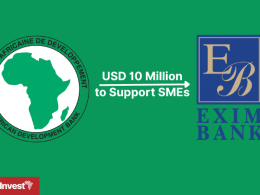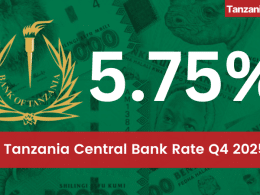TanzaniaInvest had the pleasure of interviewing Ken Cockerill, Chief Executive Officer (CEO) of Stanbic Bank Tanzania.
Cockerill discusses the goings-on in the banking industry of Tanzania, the bank’s expansion strategy and the current trends in the Tanzanian economic and business climate.
TanzaniaInvest (TI): Standard Bank Group (JSE:SBK) is the largest African bank by assets, and operates in 20 countries across Africa.
The group has been operating in Tanzania under the Stanbic Bank brand since 1995, following the acquisition of Meridien Biao Bank.
What is the importance of the Tanzania market for the group?
Ken Cockerill (KC): We see Tanzania as an important growth opportunity.
If you look across the African continent, countries in East Africa, and in particular Tanzania, have reflected consistently high growth rates over the last decade, and we expect that to continue in the years ahead.
The Tanzanian economy is diversified, and that’s currently an advantage, as opposed to certain other countries that are more reliant on oil and other primary commodities.
TI: What are your main goals in Tanzania?
KC: First and foremost, we need to achieve an acceptable return on equity (ROE), in excess of 20% over the next few years.
We intend to achieve this by consistently delivering exceptional customer experiences, and thereby growing our customer base and market share.
At the same time we recognize that in order to achieve our aspirations, it is imperative that we contribute to the long-term viability and success of the communities in which we operate, by facilitating economic growth and social development.
TI: In which sectors of the Tanzanian economy is Stanbic focusing?
KC: Our focus is on all the key growth sectors: agriculture, telecommunications, oil and gas, power and infrastructure, fast-moving consumer goods etcetera.
But if you look at the opportunities for public-private partnerships, we believe the main ones reside in power and infrastructure in the short term, and probably oil and gas in the years to come.
TI: With more than 50 banks operating in Tanzania, what are your key focus and competitive advantages?
KC: The Tanzanian financial services sector is very congested. The market looks overbanked, but we still see opportunities for us.
There are few banks in Tanzania that can effectively compete with us in the corporate segment, because of the group’s extensive footprint on the continent, our sector and product expertise, and our cross border capabilities.
Our cross-border capabilities allow us to provide multi-country banking solutions, with access to the group’s larger funding and capital bases offshore, together with the international capital markets.
We also have the backing of the Industrial and Commercial Bank of China (ICBC), the largest bank in the world, which has a stake of 20% in Standard Bank Group.
That gives us a major competitive advantage because it affords us the opportunity to partner with the public sector and private corporates on all the large infrastructural deals and other investments.
TI: Talking of the public sector, what is your take on the impact on business of the austerity measures and aggressive reforms being introduced by the current government?
KC: The new country leadership has outlined ambitious plans to tackle corruption, improve public sector efficiency and boost living standards, but fiscal limitations remain an impediment to achieving these aspirations.
Whilst we believe that the reforms underway are well intended, the execution has been problematic, and this has created significant headwind for the business community and a general slowdown in economic activity.
There could be more consultation with the private sector and other stakeholders before implementation. There is thus work to be done to transform the current situation into an environment that’s more conducive to doing business.
Many of our customers are adopting a wait-and-see attitude, postponing investments, because of the uncertainty around changes that are coming very rapidly and are quite difficult to adapt to.
Having said that, we believe that because the intent is good solutions will be found that will be beneficial to the business community in the medium to longer term.
TI: In addition to corporate banking, your core business, which other segments are you looking to expand in Tanzania?
KC: We will be looking to leverage off our existing position within the corporate and commercial segments, in order to capture the associated value chains – personal customers, suppliers, buyers and other stakeholders.
We also intend to grow our retail and SME customer segments, with greater use of smart technology and digital platforms.
The number of active users of mobile banking in Tanzania is growing very rapidly, whereas the growth in traditional bank accounts has been much less impressive.
Technology enhancements and the right partnerships are thus key focus areas for us going forward, to enable us to deliver convenient and affordable financial services.
TI: Tanzania’s rural population is fast migrating to urban centers. This is putting pressure on the housing market, as well as generating opportunities.
However, access to finance is still a challenge. How is Stanbic participating in the real estate sector in Tanzania?
KC: We have been active participants in housing finance in Tanzania for many years, and we will continue to play a significant role going forward.
If you look at the value of mortgage financing, we reside in the top three lenders, and we were one of the first to offer that product.
There are some challenges, such as the judicial system and how easy it is to realize mortgaged assets when something goes wrong, and the domestic currency interest rates are quite high. These will hopefully be addressed over a period of time.
The Tanzania Mortgage Refinance Company (TMRC) has played an active role by creating awareness about mortgage financing, but also in terms of providing long-term funding to the commercial banks to support them in the mortgage lending game.
The rapidly urbanizing population in Tanzania, combined with a rapidly growing middle class, is leading to a greater demand for housing and robust growth in mortgage financing, albeit off a relatively small base.
TI: Nonetheless, some argue that there are signs of slowdown in real estate in Tanzania. What is your take on that?
KC: The Tanzanian property market has been very buoyant for many years, but there’s been a distinct slowdown in recent times.
I think this is partly due to a slowdown in the offshore gas sector, as there was frenetic activity during the exploration days, with strong demand for both retail and commercial real estate.
In addition, the general slowdown in economic activity as a result of the current reforms underway has also had an impact, together with a slowdown in regional trade as a result of certain neighboring countries feeling the effects of a worldwide slump in commodity prices.
TI: Do you think that the two credit bureaus that have been operating in Tanzania in the last two years have eased the lending process and lowered the high cost of borrowing?
KC: It’s taken a while for the banking industry and credit bureaus to build comprehensive and reliable databases, but substantial progress has been made and the industry and the market in general is now starting to reap the benefits.
We believe that the credit bureaus will assist in effectively reducing non-performing loans and credit loss rates, which should in turn reduce the overall cost of borrowing and make it more affordable to borrow for a greater section of the market.
TI: To conclude, what is your view on the role of Stanbic/Standard Bank in Tanzania?
KC: Being part of the Standard Bank Group we see Africa as our home, and our primary purpose as driving its growth.
We are committed to raising education standards in Tanzania, as we strongly believe that investing in education is the cornerstone for future growth and prosperity of the country.
With this in mind we recently handed over TZS50m for the development of Magomeni Primary School in Mtwara, and our intention is to continue to be involved with schools in the years ahead.










